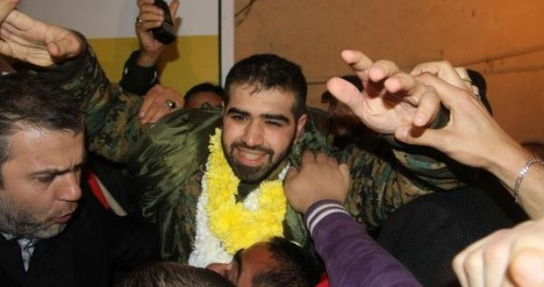Hezbollah, Al-Nusra, and Lebanon
Diana Moukalled/Asharq Al Awsat
Tuesday, 2 Dec, 2014
Recently, and quite suddenly, the Lebanese Shi’ite group Hezbollah announced that one of its fighters held captive by the Al-Qaeda affiliate, the Al-Nusra Front, had been freed in return for two Al-Nusra fighters which it had captured. And so it was that the media outlets associated with the Lebanese group celebrated this new “divinely ordained victory,” another in a long line of victories continuously trumpeted by this group which does not seem to suffer any defeats.
These media outlets, however, were a little confused, even nervous, when it came to referring to the people who had abducted one of Hezbollah’s members: are they “armed fighters,” “a free army,” or simply “Al-Nusra”? This uneasiness was especially clear when the group was speaking of the negotiations it had carried out to free him. It is one no doubt related to the group’s role in the Syrian conflict, and which makes clear a number of previously fuzzy issues.
Earlier, Hezbollah had successfully prevented the Lebanese government from negotiating with the Al-Nusra Front over the release of the Lebanese army soldiers which Al-Nusra had abducted back in August. But here it was, now doing what it had previously forbidden the government to do, making a mockery of the country—or whatever is left of it—and celebrating this prisoner exchange—whose details still remain murky—right in front of the eyes of the families of those Lebanese soldiers still held captive.
So, what are the details of these negotiations? Why did Lebanon allow this exchange to take place when those fighters from Al-Nusra that were freed were known to have been involved in the abduction of the Lebanese soldiers? Why was the release of these fighters not considered a case of “bringing down the Lebanese state” as Hezbollah MP Mohammad Raad said when criticizing the idea of the Lebanese government’s negotiating with the extremist group? And, more importantly, why should the prospect of the Lebanese government’s prisoner exchange with Al-Nusra be considered a defeat, and something forbidden, while Hezbollah’s doing the same is a victory, and very much allowed; what is the difference here?
Such questions lead one to wonder how tight a grip Hezbollah has over the Lebanese government when it comes to the former’s involvement in the Syrian conflict. For once again the government has been impotent over this issue, in this case putting the freeing of a Hezbollah soldier captured in Syria above that of its own army’s soldiers, who were captured in Lebanon by an invading force while attempting to defend the country’s borders and its people. It is simply impossible not to make a comparison between the two: While Hezbollah has succeeded in imposing its agenda on the Lebanese government, the latter has only succeeded in providing a cover for the Shi’ite group; and while Hezbollah’s manic media machine was celebrating the return of one the group’s members, the families of those abducted army soldiers were drowning in sorrow and worry over the fate of their loved ones. For them it must be now crystal clear that the Lebanese government only considers their sons as second-class citizens.
Here we see how much Lebanon itself is outside the picture. Those who view that it is not realistic to make comparisons between the Lebanese soldiers and the Hezbollah fighters, are but peddling in maliciousness of the highest order. For how is Hezbollah outside the purview of the state when it is the one in control of Lebanon’s decision-making and its destiny?
All of this fraudulent talk reminds one of the many pictures plastered across walls all over Lebanon of young men who have died in the Syrian conflict, which tell us these men died as “martyrs” in Syria, when we don’t know when, how, or even why they died.
Hezbollah’s secrecy over its role in the Syrian conflict poses further challenges and dangers for Lebanon. In the end, a Lebanese group is fighting in this conflict and the Lebanese know not the full extent of its involvement or losses, nor the real nature of its mission here. The Lebanese must simply in the end reap the results of this without being consulted over it. Yes, the Lebanese are paying the price here with their security and their lives, just as the Syrians are. And the abducted Lebanese soldiers are but a part of this, in essence abducted by two terrorist organizations, part of the price we have paid and are paying. And to add insult to injury here, let us remember the fact that Hezbollah has the right to negotiate for the release of its fighters, but the Lebanese government has no right to negotiate for the release of its soldiers.




















